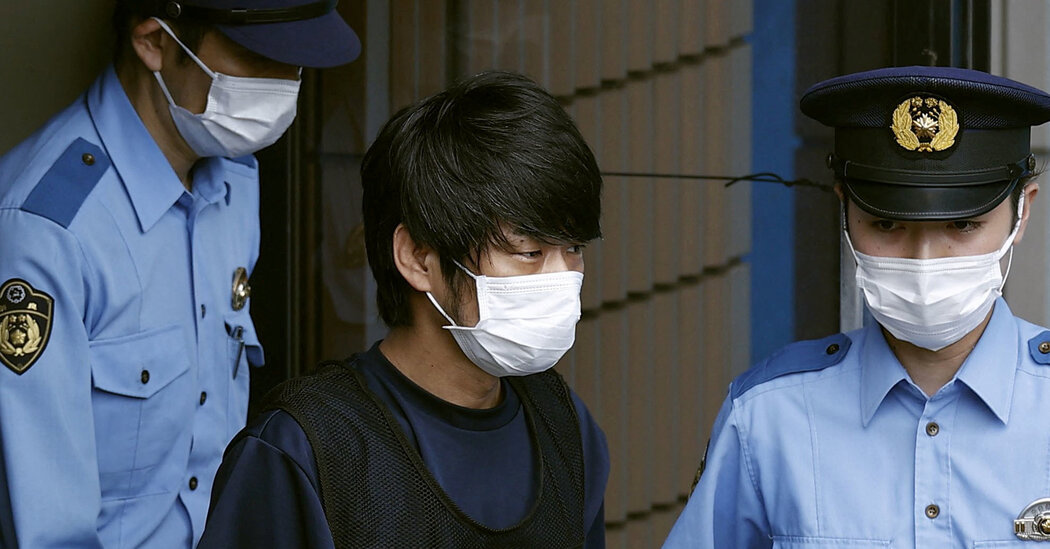TOKYO — When Tetsuya Yamagami was arrested after the assassination of former Prime Minister Shinzo Abe of Japan, he told police that he “held a grudge” against a “certain group”. But authorities have not identified the organization or its connection to Mr. Abe explained.
The investigation, amid a whirl of speculation in the Japanese media, now focuses on the Unification Church, the religious group known for its mass marriages and attempts to cultivate relations with conservative political parties around the world.
At a news conference on Monday, church officials gave details about the organization’s ties to Mr. Yamagami and described her as an old member. She had joined the Church in 1998 but lost contact with the group for a long time before returning earlier this year, said Tomihiro Tanaka, the head of the Church’s Japan branch.
The church, which did not specifically identify itself as the group named by police, said it had no records showing that Mr. Yamagami had ever been a member and was not aware of any threats he made against her. members were targeted. The church also said it had no direct relationship with Mr Abe, although it had been in contact with other lawmakers through an affiliated organization.
Police have revealed few details about Mr Yamagami, 41, who has been charged with murder. Abe was shot from behind with a homemade gun on Friday in Nara while giving a speech to a candidate, two days before parliamentary elections.
After his arrest, Mr. Yamagami informed the police that he had served in the Japanese army. A person with the same name and date of birth served in the country’s navy for three years.
During a press conference on Monday, police said Mr. Yamagami the day before shooting Mr. Abe had confessed to testing an improvised weapon. Police said on Friday that several improvised weapons had been seized from Mr. Yamagami.
The shooting shocked a country where gun violence is rare, but during a Monday night vigil for Mr Abe at one of Tokyo’s largest Buddhist temples, there were few signs of heightened security. Mourners coming from the street laid flowers in front of a picture of Mr. Abe. Nearby, a stream of dignitaries in black suits and dresses poured in from nearby train stations or arrived by car at a guarded gate, though no one seemed to enforce strict security checks.
The mourners gathered a day after Mr Abe’s Liberal Democrat Party won the Senate election. On Monday afternoon, Prime Minister Fumio Kishida praised Mr Abe’s leadership and pledged that the newly delegated LDP would work to achieve its long-held goals, including the revision of the country’s pacifist constitution.
The Japanese people had made a “stimulating appeal” to the party to preserve the legacy of Mr. Abe safe, he said. “It is unbearable that a great leader, loved by the whole world, was suddenly robbed of his life by violence.”
The Unification Church was founded in South Korea in 1954 by Reverend Sun Myung Moon. It later expanded abroad, building a network of newspapers and civil society organizations that uses it to develop ties with conservative political parties around the world. It also generated questions about its recruiting and business practices. In the 1970s and 1980s, the group faced lawsuits over solicitation of funds and accusations of “brainwashing” by parents who said their children were forced to participate.
The church established its branch in Japan in the late 1950s and soon found common ground with right-wing Japanese politicians, including Mr. Abe’s grandfather, Nobusuke Kishi, because of their shared hostility to communism.
Ties between church-affiliated organizations and members of the ruling LDP developed over the following decades as the church grew in size and Japanese followers generated billions of dollars in revenue for the group.
But the Unification Church’s influence in Japan has declined in recent decades, and it has struggled to recruit new members since a schism following Mr Moon’s death in 2012, said Yoshihide Sakurai, a professor of sociology and religion at Hokkaido. University that has studied the Unification. Church in Japan.
Church-related groups have continued to attract some top Japanese lawmakers to their events.
In 2021, Mr. Abe and other politicians from several countries, including the United States, admitted to a meeting in South Korea led by a group affiliated with the Unification Church. Speaking via video feed, Mr. Abe praised the group for its “focus and emphasis on family values.”
And in 2022, at a conference in Seoul to promote peace in the Korean peninsula, a speaker made brief written remarks on behalf of Mr. Abe. They expressed the hope that the meeting would “open new avenues for peaceful reconciliation”.
News reports about Mr Abe’s connection to the 2021 event have been criticized in Japan from the country’s Communist Party and other groups, including a lawyers’ association that has waged a decades-long campaign against the Unification Church’s activities in Japan.
In an open letter to Mr. Abe asked the association, The National Network of Lawyers Against Spiritual Sales, to break its association with the church and its affiliates, writing that “partnering with and supporting these events is definitely not a good idea.”
His connections with the Unification Church were likely “very tenuous,” said Mr Sakurai, who described Mr Abe’s comments to the group as “common work for politicians looking to gather votes.”
The church was just one of many religious organizations with right-wing political beliefs that Mr. Abe and his fellow conservatives in the LDP have counted on for political support, said Levi McLaughlin, an associate professor at North Carolina State University who studies the link between politics and religion in Japan.
“None of this is unusual, and it certainly isn’t exclusive,” he said, adding that it “just happens that the church shares many of the LDP’s policy platforms and Abe’s specifically.”†
Motoko Rich and Hikari Hida reporting contributed.

